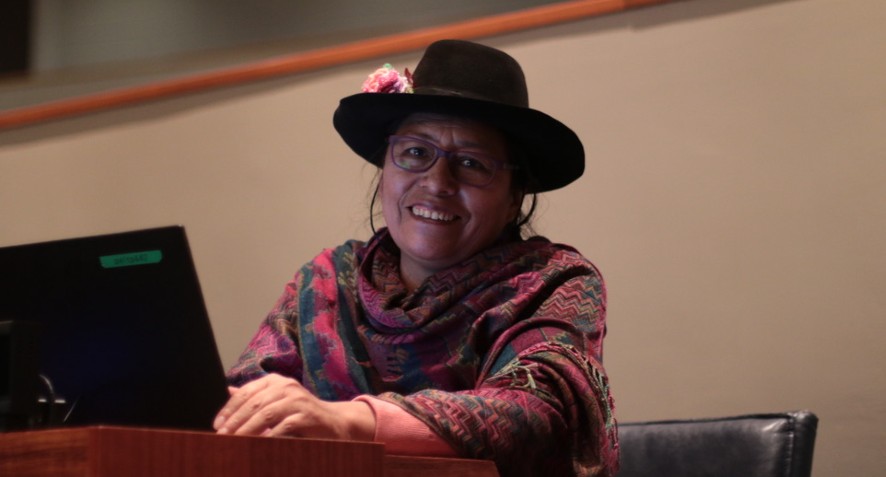
- Details
- By Jenna Kunze
NEW YORK—Today was all about autonomy.
On the second day of the two-week long United Nations Permanent Forum on Indigenous Issues, states, sovereign nations, tribal governments, and nonprofit organizations weighed in on the significance of a term many delegates referred to by its acronym, FIPC—free, prior, and informed consent.
The concept is directly tied to self-determination and provided for in six separate mentions throughout the United Nations Declaration on the Rights of Indigenous Peoples, the most comprehensive international instrument on the rights of Indigenous peoples.
But FPIC is often in direct contrast with a nation’s private sector, and economic development.
Delegates from Australia, Mexico, Kenya, the Sámi Parliament of Finland, Peru, Nepal, Northern Siberia, Guyana, Burundi, South Africa, the National Congress of American Indians, Chad, Hawaii, Northeast India, Paraguay, Indonesia, the Sami Parliament of Norway, the Assembly of First Nations in Canada, and Venezuela each gave three minutes of testimony effectively saying the same thing: Native land is being taken without free, prior, and informed consent.
A delegate from the Sámi Parliament of Finland and Chief Francis Laceese (Tl'esqox) from the Tsilhqot’in Nation in B.C. both spoke about huge mining projects on Native land.
“In Finland, the mining companies have lately been granted several explorations and reservations to large areas in the Sámi territory,” the Sámi delegate said on Tuesday. “Although this is just the first step in the process of … establishing the mine, for reindeer herders, receiving news that a data mining company has made a reservation on their ancestral lands is like receiving a death threat.”
Chief Francis Laceese, one of six chiefs that make up theTsilhqot’in Nation, said Indigenous people are still fighting every day for their survival.
“The time for talk is over,” he said. “Government and industry are still taking whatever they can from our lands every day. That's the way it is.”
Many nations called upon the Forum to address retaliation against land defenders. Over a third of the attacks on human rights defenders in 2020 were reportedly related to resource exploitation and over a third of human rights defenders killed were indigenous, according to the European Union delegate.
While many of the testimonies struck similar chords to Laceese’s, others—such as those from the Vatican’s Holy See delegation (identified by its own digital nameplate, whereas every Indigenous organization—including sovereign tribes—were simply identified as “Indigenous Peoples Organization”), as well as delegates from authoritarian governments of China and Russia, sounded hollow in light of current truths.
“Unfortunately, economic and ideological colonization continue to be carried out without concern for the human rights of Indigenous people for the environment in which they live,” The Holy See delegate said, without a mention of the Catholic Church’s enormous role in such colonization. He said that Pope Francis encourages “meaningful consultation with Indigenous people…. and the free, prior and informed consent of Indigenous people for business and commercial activity affecting them.”
Similarly, the delegate from China said his country “fully supports the rights of Indigenous People through free, prior, and informed consent,” later adding that the Chinese government requires FPIC in oversea development projects.
This, backdropped by the Chinese government’s known, ongoing human rights violation— the genocide of their own Indigneous ethnic group in Northwest China, the Uyghurs— has delegates around the room exchanging knowing glances.
While other member states used their opportunity to speak to express their support for their Indigenous peoples, I later heard murmurings of annoyance for states talking politically with very little actionable outcomes.
National Congress of American Indians President Fawn Sharp called the implementation of FPIC the “paramount issue” facing Indigenous peoples in the United States and across the world. She called on Permanent Forum former co-chairs to meet with Indigenous people to create “meaningful and actionable steps.”
“This right is inherent, indivisible and absolute,” Sharp said. “Indigenous peoples must have the absolute right, the inherent right, to determine our futures freely without external interference.”
More Stories Like This
Native News Weekly (August 25, 2024): D.C. BriefsNavajo Nation Gaming Enterprise Marks Problem Gambling Awareness Month With $3.4M in Support
Cheyenne River Youth Project to Celebrate Women’s Strength at Barbie-Themed Passion for Fashion on March 14
Celebrating Native American Women
Native Bidaské: The Illusion of Freedom and the Myth of America 250, Leonard Peltier Speaks Out
Help us defend tribal sovereignty.
At Native News Online, our mission is rooted in telling the stories that strengthen sovereignty and uplift Indigenous voices — not just at year’s end, but every single day.
Because of your generosity last year, we were able to keep our reporters on the ground in tribal communities, at national gatherings and in the halls of Congress — covering the issues that matter most to Indian Country: sovereignty, culture, education, health and economic opportunity.
That support sustained us through a tough year in 2025. Now, as we look to the year ahead, we need your help right now to ensure warrior journalism remains strong — reporting that defends tribal sovereignty, amplifies Native truth, and holds power accountable.
 The stakes couldn't be higher. Your support keeps Native voices heard, Native stories told and Native sovereignty defended.
The stakes couldn't be higher. Your support keeps Native voices heard, Native stories told and Native sovereignty defended.
Stand with Warrior Journalism today.
Levi Rickert (Potawatomi), Editor & Publisher


